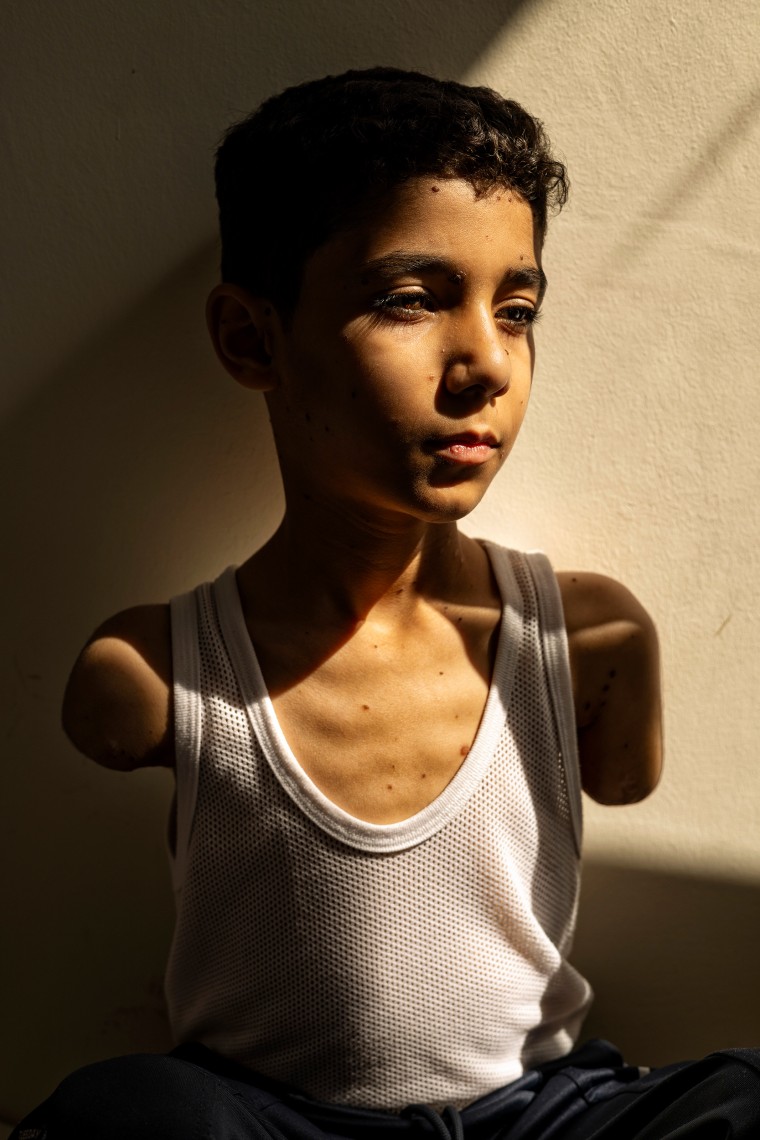A haunting portrait of a young Palestinian boy from the Gaza Strip who lost both of his arms in an Israeli strike has been named World Press Photo of the Year for 2025.
Mahmoud Ajjour, 9, was fleeing an Israeli attack in Gaza with his family when he turned back to urge his loved ones to move forward, the World Press Photo organization said in a statement accompanying the picture taken by Palestinian photographer Samar Abu Elouf.
Then he was hit in an explosion, the Netherlands-based nonprofit added.

One of Ajjour's arms was completely severed, while the other was left severely injured and ultimately had to be amputated.
“One of the most difficult things Mahmoud’s mother explained to me was how when Mahmoud first came to the realization that his arms were amputated,” Abu Elouf said in the statement from World Press Photo. “The first sentence he said to her was, ‘How will I be able to hug you?’”
Ajjour's mother, Nour Ajjour recalled that painful moment in a phone interview with NBC News on Friday.
"The first few days were very difficult. He was in a lot of pain as there was no anaesthetic," she said. "He would look at his hands and not see them. He would scream and say, 'where are my hands?' And the first thing he said was, 'how will I hug you?' and 'how will I pray?'"
Ajjour was evacuated out of Gaza for treatment in Qatar's capital, Doha, where Abu Elouf took his portrait for The New York Times. The photographer also fled to the city.
Ajjour is one of hundreds of children in Gaza to have lost at least one limb during the war, which has seen more than 51,000 people killed since Oct. 7, 2023, according to the health ministry in the Hamas-run enclave.
UNICEF warned in December 2023 that around 1,000 children in Gaza had seen one or both legs amputated alone since Oct. 7, 2023, when Israel began its military campaign in the enclave following the Hamas-led terror attacks in which some 1,200 people were killed and around 250 taken hostage, marking a major escalation in a decadeslong conflict.
“These are unbelievable numbers,” Dr. Ahmed Al-Fara, head of the pediatric department at Nasser Hospital in southern Gaza’s Khan Younis told NBC News’ crew on the ground in an interview earlier this month, noting that thousands of children have also been killed and more still have been left without one or both parents.
Al-Fara said he could not understand “the silence of the world” in the midst of the widespread devastation in Gaza, where much of the enclave has been destroyed.
Many of the operations children in Gaza have had to undergo have been done without anesthetic, according to UNICEF, with the enclave's health care system also hit hard by Israel's offensive, which it restarted last month after a pause in the fighting.
Talks for a permanent end to the fighting were supposed to begin after the first phase of the ceasefire deal — in which Hamas released 25 living hostages and the bodies of eight in exchange for around 1,800 Palestinian prisoners and detainees — ended March 1.
But Israeli forces shattered the fragile truce and have since launched airstrikes on the enclave while also resuming military ground operations.
Israel has also barred the entry of medical supplies, along with food, water and other vital aid, during a more than monthlong blockade of the enclave.
Efforts to secure a more permanent ceasefire and secure the release of hostages held in Gaza have so far failed to yield results.
In the meantime, Ajjour is learning how to live without his arms.
"We all help Mahmoud in everything, in food, drink, clothing and the smallest things." But she said her son is also learning to use his feet to do things like writing and playing games on his mobile phone.
His hope now, she said,is to receive prosthetic limbs — a dream now shared by a growing number of children in Gaza.
